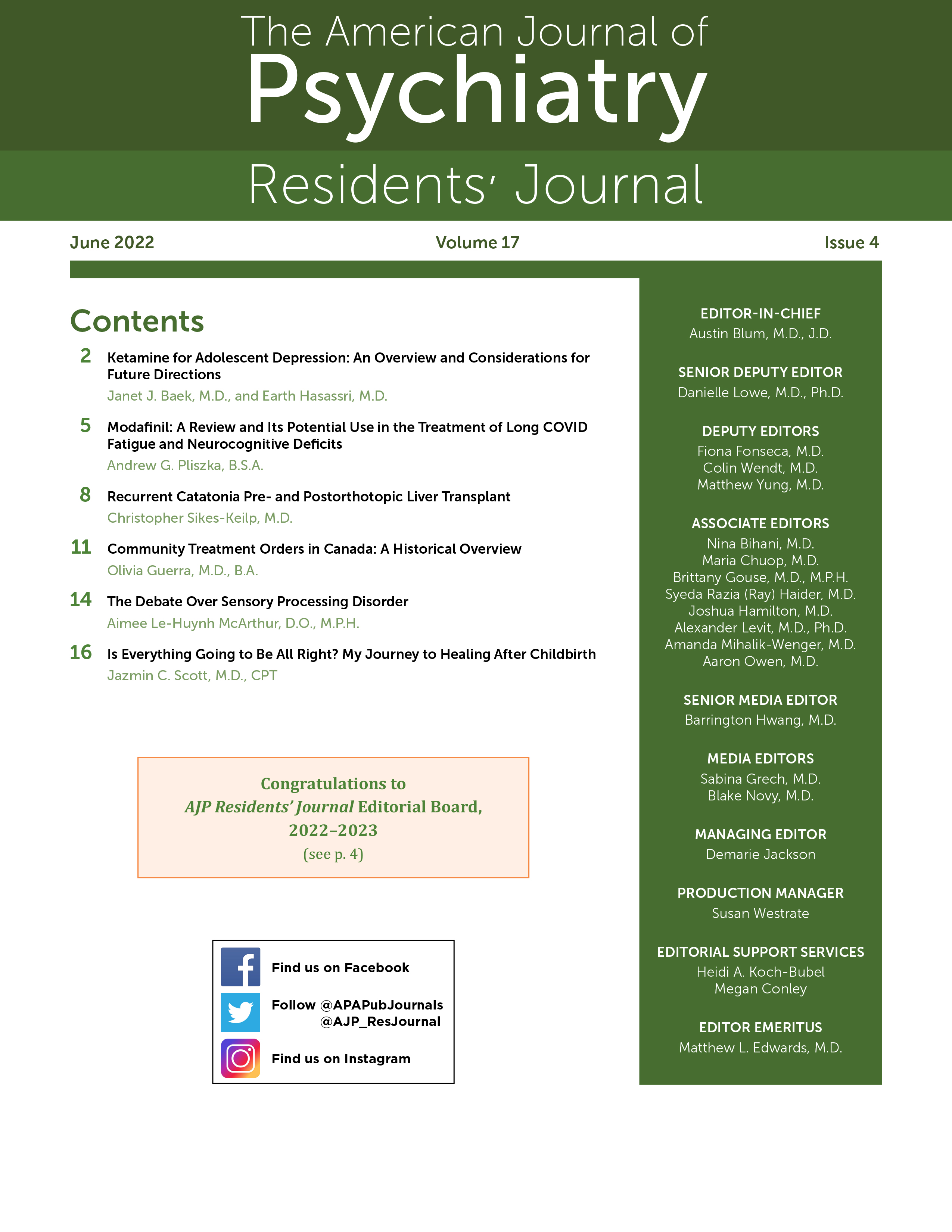Dread overtook me as I watched my baby’s heart rate plummet on the monitor. The obstetrics resident entered my room to inform me that despite all my efforts, we were going to the operating room for a cesarean delivery. I was so overwhelmed by feelings of frustration and disappointment that all I could do was cry. As an African American female, alarming statistics about the rate of African American women dying in childbirth were at the forefront of my mind (
1). As I became medically unstable on the way to the operating room, I feared that I would become a part of these statistics. In a moment of desperation, I asked the provider next to my bed if I was going to die. Despite his reassurance, I was not certain I would survive my surgery as I drifted in and out of consciousness in the operating room. I saw my perfect baby for only a brief moment before I drifted out of consciousness again. The next thing I knew, I was being awakened by a nurse imploring me to stay awake because I was not breathing. I missed out on doing the first feeding and “skin to skin” time with my baby because for several hours I was too weak to hold my child. It was incredibly difficult to cope with the feeling of missing out on all the important first moments of my child’s life. This happened during my intern year of psychiatry residency training, and I struggled with feelings of shame, fear, and failure related to my unexpected surgery.
Over time, I believed that I had moved on from these intense, negative emotions. When I returned to the labor and delivery unit of the hospital nearly 4 months later to see a patient with demographic characteristics similar to mine, it became clear that I had not processed these emotions. As the treatment team began discussing an emergency cesarean and nonreassuring fetal heart tones with the patient, my mind returned to my own delivery experience. After months of burying these memories, I finally realized that I had to address what had happened.
My therapist recommended written exposure therapy for trauma (
2). The first few weeks were spent writing about my experience in deeper detail, which was emotionally exhausting, and there were times I didn’t want to do the weekly writings, even though I knew it could help. At every session, I read out loud what I had written, and the therapist instructed me to pick the most difficult part of what I wrote and focus on writing about that in deeper detail for the next session. We talked at length about my fears as an African American woman in childbirth and my feelings of anger and failure. In the last session, I was instructed to write a letter to my child. I was finally able to reflect on this experience with less intense, negative emotions because they were replaced by appreciation for my child.
A few months later, I sat across the room from a patient with depression and learned that she had a young baby at home. I identified with her because I saw the ways our situations were similar as two African American women with young children at home. As we spoke, I sensed there was something deeper underlying her depressed mood and decided to ask about her childbirth experience. My patient slowly recounted a series of events that sounded similar to my own experience. Had this happened at the beginning of my training year, I don’t think I would have known how to respond. However, in that moment, I understood my patient’s anguish at a deeper level and offered the simple statement that I had experienced something similar. It was important to me that I share this small personal detail about myself because psychiatry is a specialty in which only 2% of providers are Black, and therefore it may be difficult for patients to be open with providers with whom they cannot identify (
3). I hoped to create a sense of universality for my patient to improve our therapeutic alliance (
4).
If someone had asked me 5 years ago what my ideal childbirth experience looked like, I might have gone on about details such as who should be present, bonding with my new baby by doing skin to skin, and basking in my ethereal glow as the postdelivery goddess I assumed that I would be. Unfortunately, my birth experience did not go as planned. I’ve learned to accept this experience, and part of me is grateful for this journey. I can’t change what happened, but I learned to change my response to these events. I feel better equipped to understand and empathize with others who have had difficult birthing experiences. Plus, having a healthy child with lots of personality and who calls you “Mama” is worth it.
Acknowledgments
The author thanks Sean Wilkes, M.D., M.Sc., for editorial advice.
